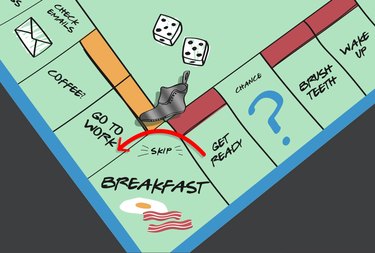
We're all familiar with the hallmark sign of hunger: a growling belly. But a need for food can present in more ways than one.
Indeed, some pretty common signs and symptoms could be your body's way of telling you that it isn't getting enough fuel.
Video of the Day
Video of the Day
Here, experts highlight six signs you're actually hungry — even if your stomach isn't grumbling.
Lesser-Known Hunger Signs
1. You’re Fatigued
Picture this: You skip breakfast in a rush to get to the office and by 10:30 a.m., you're feeling ultra-fatigued. There's a good reason for that.
When we skip meals or eat too few calories, our blood sugar (or glucose) levels dip. Without adequate glucose, our cells don't get the energy they need. That's why one of the hallmark signs of low blood sugar, or hypoglycemia, is fatigue.
Chronic breakfast-skippers may wonder: "Do I really have to eat breakfast if I've always felt fine skipping it?'
There's no reason to force-feed yourself a morning meal, says Dr. Sylvia Gonsahn-Bollie, MD, a board-certified internal medicine physician and CEO of EmbraceYOU Weight & Wellness: "Your lack of appetite [in the morning] is your body telling you that you need more time to 'reset' your metabolism."
While many people do well with a 10- to 12-hour break between dinner and breakfast, everybody is different.
If you've never been a breakfast person, experiment with incorporating an a.m. snack and assessing how it makes you feel. Charlotte Shron, RD, a registered dietitian and clinical care manager at Culina Health, says she encourages people to at least eat a small, nutrient-dense snack within two hours of waking to help stabilize their blood sugar levels and set the tone for the rest of their day.
Then Why Do Some Say Intermittent Fasting Improves Energy and Focus?
"People's different energy responses to intermittent fasting highlight a vital and often overlooked fact in diet culture: that everyone is different,” Dr. Gonsahn-Bollie says.
“Theoretically, an individual should experience decreased focus due to depleted levels of rapidly available energy sources, such as glucose, when fasting. However, the body uses other sources of fuel when glucose isn't available during fasting periods.”
When the body is in ketosis, for example, it uses fat for energy instead of glucose. “It's still debatable if ketosis will improve short-term focus,” Dr. Gonsahn-Bollie notes. “However, studies show ketosis and intermittent fasting improve neurological conditions such as Alzheimer's disease, multiple sclerosis and epilepsy.”
While some people experience increased mental acuity by skipping a morning meal, others may miss out on critical sustenance to kickstart their day.
2. You’re Bloated
While most of us associate bloating with overeating, it's possible to experience abdominal distention as a result of eating too little.
"Going too long without eating can cause gas to build up in your gastrointestinal system," Dr. Gonsahn-Bollie explains. "You can get constipated if you drink inconsistently or do not eat enough fiber with your meals."
To make things even more complicated, feeling bloated or constipated can make us less likely to feel hungry. And so the cycle repeats.
Eating at regular intervals, moving your body daily and getting enough fiber and fluids can help combat constipation so your hunger cues keep on keeping on.
3. You’re Irritable
If you're feeling 'hangry,' (that is, hungry and angry) there's a good chance your stomach is sending you signals that it's time to eat. But sometimes we feel irritable before the hunger pangs kick in.
Hanger can be caused by dips in blood sugar levels that make it harder for us to control negative emotions such as anger and irritability, Dr. Gonsahn-Bollie says. "Another theory is that we learn early on to associate physical hunger with a negative psychological state, so whenever we feel hungry, we interpret the sensation negatively."
Mindful eating tends to be off the table when we feel hangry, as dips in blood glucose levels increase our likelihood of overeating. "When we enter a state of hangriness, we tend to eat larger meals than we would have otherwise due to our bodies screaming for food," Shron says.
Avoiding hanger by focusing not only on balanced meals but also on the timing of meals is one of the best ways to control our blood sugar and, by extension, our mood, Shron says.
4. You’re Thinking About Food 24/7
One of the key features of restrictive eating disorders like anorexia nervosa is a strong preoccupation with thoughts about food, according to the National Eating Disorder Association (NEDA).
Even if you're not struggling with an eating disorder, constantly thinking about food may be a sign that your body isn't getting enough calories. It's actually a protective mechanism: Our brains want us to consume enough energy so that we can function optimally.
Get curious if you notice an uptick in thoughts about food — it could be your body's way of telling you that you're restricting too many calories or simply not eating regularly enough throughout the day.
5. Your Focus Is Off
Glucose is the brain's preferred source of fuel, so it only makes sense that focus may be lacking when we skimp on starches.
"When people complain about a lack of mental stamina throughout their day, I look at their intake first," Shron says. "Just like a car needs gas, our bodies need food to get from point A to point B."
Not all calories are created equal, so some foods support steady focus more than others. "Processed, high-sugar, high-fat foods can cause major spikes in energy followed by a fast decline that leaves you feeling depleted," Shron explains.
On the flip side, balanced meals that contain protein, fat and high-fiber carbohydrates will support longer-lasting focus and improved productivity.
6. Your Head Hurts
Yet another symptom of low blood sugar, a headache can be a helpful (and painful) sign that it's time to eat.
By now you know that the brain relies on glucose to function. When glucose is in low supply (say, after you've gone too many hours without food), the brain sends signals to the body to refuel, per the National Headache Foundation. Those signals can present on a spectrum from dull to throbbing pain in the temples.
If you're delaying lunch due to a busy workday, reach for food instead of aspirin as soon as you start to feel a headache coming on.
How Often Should I Be Eating?
How often and how much we should eat to satisfy hunger depends on multiple factors, including our age, medical conditions and physical activity levels, among others.
A good rule of thumb is to eat every four hours throughout the day. This usually shakes out to three meals and one or two snacks daily.
How to Tune in to Hunger (and Fullness) Cues
Getting in touch with hunger and fullness cues can take time, especially when we're accustomed to ignoring or overlooking them. Here are three simple ways to start getting more familiar with your hunger and fullness cues:
1. Keep a Food Journal
Keep a food journal for a couple of weeks and use the hunger/fullness scale to rate your level of hunger before your meal and your level of fullness after your meal. F
or reference: The number 1 on the hunger/fullness scale represents the feeling of being so ravenous that you could faint. The number 10 on the hunger/fullness scale represents the feeling of being so stuffed that you feel sick.
Taking note of how you feel before and after meals and snacks can help you identify which eating habits are helping or hurting your health.
2. Limit Distractions
"I commonly see patients eating in front of the television, scrolling or multitasking at mealtimes, whether it be writing work emails or prepping their kids' food," Shron says. "This often results in a total loss of awareness around consumption, which can lead to overeating and imbalanced meals."
To practice more mindful eating, make mealtimes screen-free and try putting your fork down in between each bite. Eating at a slower pace can promote greater awareness around satiety.
3. Press Pause
It's easy to ignore the lesser-known signs of hunger listed above if we never actually take the time to notice them. Make it a point to pause throughout the day and scan your body from head to toe. This assessment, combined with food journaling, can make it easier to understand when your body needs nourishment.
For example: If you notice your focus taking a nosedive and see that you haven't eaten in seven hours, it's highly possible that hypoglycemia is to blame.
Should I Eat Even When I’m Not Hungry?
Sometimes eating for reasons other than physiological hunger is encouraged. After all, who eats birthday cake because they're genuinely hungry?
While the majority of our food choices should be made based on physical hunger cues, eating in the absence of hunger can also be a necessary or healthy choice in some situations.
Say you're attending a day-long conference and know your next meal won't happen for many hours. In this case, eating an earlier and larger breakfast than usual may be necessary to fuel you through the afternoon. While you may be eating without feeling genuinely hungry, you're using your nutrition intuition to sufficiently nourish yourself for the long day.
And in the case of birthday cake, you're most likely eating for joy, which is just as important as eating for health.


